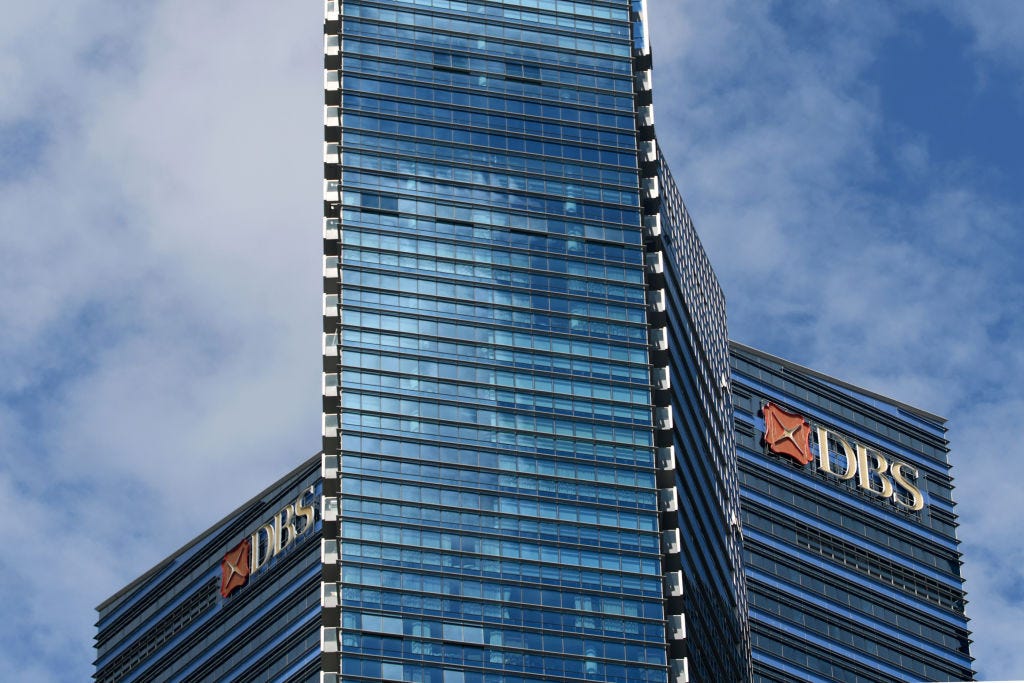

Photo by ROSLAN RAHMAN/AFP via Getty Images
- DBS Bank, a Singaporean multinational banking corporation, accelerated its digital transformation to respond to challenges posed by COVID-19.
- 5G-enabled banking has been identified as a new normal as secureand contactless banking continues to grow in demand.
- Jimmy Ng, group chief information officer, elaborates on the bank’s problem-solving culture.
- This article is part of the Resilient Singapore series. Read more here.
In Singapore, “normal” banking is becoming more and more invisible.
Jimmy Ng, group chief information officer and head of group technology and operations at DBS Bank, a Singaporean multinational banking and financial services corporation, knows this all too well.
Named “World’s Best Digital Bank” by Euromoney, its digital transformation in the last decade has prepared DBS for a set of unique challenges the pandemic brought to this island-country. The bank that “operates like a technology company” began its transformational journey as early as 2014, when it realized technology will be its key comparative advantage.
“You can say that in 2020, we have the 20/20 hindsight,” Ng said.
One of the key ways the bank has transformed in recent years is becoming digital to the core. This investment proved necessary as Singapore went on a soft lockdown in April, described as a “circuit breaker” period. While banks are identified as essential services that will stay open during this period, DBS had shut down a significant number of branches from April to May in response to fewer customers and to protect their staff.
Responding to crisis with technology

DBS Bank
The bank recently moved from proprietary hardware and software to commoditized hardware and open source systems. This allows the bank to support multiple applications on a single server, making digitization more efficient and scalable as a business.
"We're able to meet the strong business demands and volumes with no visible loss of productivity," Ng said, recalling a surge in online search volumes on bank services when the circuit breaker began.
Customers wanted to know where and how their banking needs could be met during this period, as movement was restricted to prevent further spread of COVID-19 cases in the community.
And DBS' problem-solving culture was kicked into high gear when the first COVID-19 case was detected in the organization after an employee was found infected in early February. "We were already developing a contact tracing application ... to be able to contact-trace all the people who were in contact with this individual in the office," Ng said.
This involved compiling data of employee movement from calendar invites and security tags, as well as physical interviews with staff. The bank was able to contain the spread, with no further cases from the infected person. "That has proven to be very pivotal in the way we respond to this crisis," he said.
The bank prides itself on having the agility and speed to quickly address customer needs, then establishing a solution just as fast. Rapid prototyping means a concept can go from idea to application in just two weeks.
So, as customers expressed concerns about physically visiting a bank branch to hand in trade documents, preferring to limit exposure to the public during the circuit breaker, a digi-doc platform was rolled out within 14 days, allowing documents to be submitted digitally instead.
Accelerating innovation in a new normal for banking
It looks like this digital approach to banking is here to stay. Remote banking, where customers interact with banks through live virtual conferencing, is being implemented in DBS through Video Teller Machines (VTMs). It's the first of its kind in Singapore; one would expect no less from a bank that also functions like a technology company.
What does the future of banking look like? From Ng's perspective, the 5G network will unlock many opportunities for seamless collaboration and communication. Trial services from telcos were recently launched in Singapore this year, and Ng predicts adoption will be quick.
In fact, the bank's innovation lab has built a 5G-enabled ATM to test the possibilities of this new frontier — quick access to cash anywhere in Singapore from a transportable machine with no cables or setups required.
On an industrial level, as digital adoption increases in the sector, Ng recognizes security as an important factor in winning over consumers. "The ability for us to prevent, detect and recover from fraud is also going to be paramount," said Ng. Cybersecurity jobs are on the rise to fill roles in threat and vulnerability assessment, and security management in Singapore.
The banking industry in Singapore is making headway in digital transformation, led by a government comprising digital champions, and a technologically mature workforce. Ng identifies the two types of organizations on this journey to digitization. Those that are already digitized will accelerate initiatives as demand increases in the new normal. Organizations that are in the process of implementing digitization into its processes will feel the pressure to accelerate, too.
"What you're seeing is a rush to digitize. And our industry definitely has the bandwidth to do that."

